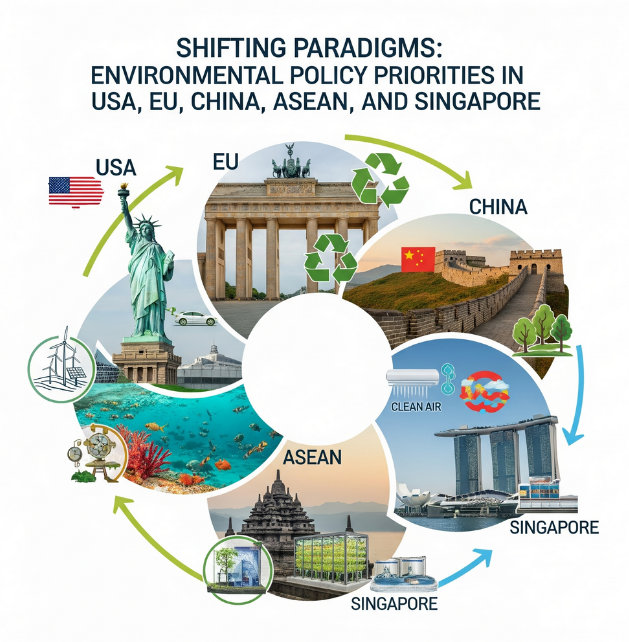Shifting Paradigms: Environmental Policy Priorities in the USA, EU, China, ASEAN, and Singapore

1. Introduction
There is a fundamental divergence in environmental policy between developed and developing nations. There is a different preference for developed nations, unlike developing nations. The developed nations give priority to pollution and its impact. The developing nations place importance on removing economic stagnation, social inequity, and environmental degradation, which is due to resource depletion, resulting in shifting priorities from correcting market prices to correcting deep-seated institutional and governance failures. We discuss such priorities for five critical and diverse economic players: the United States (USA), the European Union (EU), the Association of Southeast Asian Nations (ASEAN), the People's Republic of China (China), and Singapore, as follows:
- The Developed Nations (USA & EU): Highly developed" model, that offers priorities to cost-effectiveness, high-tech solutions, and amenity values.
- The Developing Nations (ASEAN): The priorities of ‘Developing’ nations are to solve issues arising out of heavy resource dependence, institutional weaknesses, and pressing basic health needs.
- The Growing Superpower (China): It attaches priorities to tackle severe "developing" issues (water/soil pollution) and “developed" green-tech policy.
- The Developed Outlier (Singapore): The financial hub of the world has to handle "developing" challenges through extreme governance capacity, presenting a unique model arising out of poor resource city-state.
The primary purpose is to examine environmental priorities, institutional capacities, and political realities of each model as well as the discussion on other policy priorities pertaining to reallocating public resources, adopting holistic frameworks, reforming governance, and adapting policy instruments.
2. Differing Environmental Priorities
- USA & EU: Focus on Brown Issues and Decarbonization
A brown economy is associated with high dependence on fossil fuels and environmentally destructive practices for growth despite environmental degradation. There is a high consumption of coal, oil, and gas. The industrial production process involves energy-intensive operations and involves a high volume of waste and emissions. There is no integration of the economic system with nature, causing air and water pollution, deforestation, and climate change. Thus, their priorities are shifting from the brown economy to the green economy. The US Clean Air Act and EU Industrial Emission Directive, along with other rules and guidelines, aim to reduce industrial and vehicular pollution. The Green Deal of the EU and the US Inflation Reduction Act (IRA) promote a large investment towards green technology.
- ASEAN
These nations are developing except Singapore, and these nations attach priorities to health and resource management. Most of them rely on natural resources, and most of them suffer from poverty and health issues. Heavy dependence on natural resources causes faster resource depletion. There is a challenge in water management, and core policies are directed towards water. The extreme deforestation needs to be addressed as a priority.
- China
The emerging Superpower is China, and it has top-priority polices addressing indoor and outdoor pollution. China is the largest investor in renewable resources of energy resources. It promotes long-term sustainability.
- Singapore
Singapore plans for a bright future towards a greener economy, and the top priority is to achieve zero pollution. It has established the world’s most effective water management system through NEWater.
3. Institutional Arrangement
- USA & EU
USA and EU have effective institutional support and good governance. Both of them have achieved well-funded institutions, the rule of law, and established monitoring and enforcement, as the framework presumes for developed nations.
- China
China has built a strong state capacity model, and it is different to the Western model. It has a sound and effective top-down control model, which is fast and highly rewarding.
- Singapore
Singapore has established the most successful and outstanding institutional capacity, denying any failure. The civil service is free from nepotism and corruption. The governance is highly effective and sound. It follows strong long-term strategic planning and implements the same without distortion.
- ASEAN
The ASEAN nations, except Singapore, have weak governance and rule of law.
Conclusion
These nations have identified their priorities on environmental policies, and these are variable as each nation has its own dynamic understanding of national importance and environmental references in terms of policies and practices. No policy is static since the global wisdom tends to prevail over the environmental policies and priorities. It helps to understand them for future references and the development of sound priorities on environmental policies towards sustainability. Nature and man are inseparable, and if there is any disintegration, then there is environmental degradation and human suffering. Science and technology are sound tools for sustainability, but man has to learn the causes and practices that lead to environmental degradation. International cooperation is the essence of collective action for sustainability. Carbon reduction is the theme for the future.
Back to Events & Publications